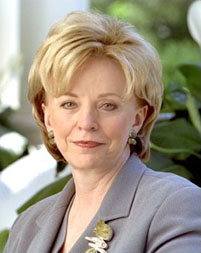
Under the New Badger Partnership, Governor Walker will appoint at least 7 UW-Madison alumni to the Board of Trustees. Who might these fine folks be? What might they believe about academic freedom? We might as well get educated. Here's the first in a series.
"Academic Freedom" by Lynne Cheney
"In the last few years, people intent on using the curriculum and the classroom to advance a political agenda have become very frank about their purpose. In an article in Harvard Educational Review, a professor at the University of Wisconsin insists that professors like herself should be very open about their intention "to appropriate public resources (classrooms, school supplies, teacher/professor salaries, academic requirements and degrees) to further various 'progressive' political agendas." This professor describes a class she teaches at the University of Wisconsin called innocuously enough "Curriculum and Instruction 607," but it has an anything but innocuous purpose. Students are taught to demonstrate in Curriculum and Instruction 607—and then they actually demonstrate, as the professor describes it, "by interrupting business as usual (that is social relations of racism, sexism, classism, Eurocentrism, as usual) in the public spaces of the library mall and administrative offices." All this, and students get three hours credit, too. Which is certainly a marked change from when I was at the University of Wisconsin in the 1960s. Students demonstrated then, but nobody ever thought of giving them credit for it."
She's talking about Elizabeth Ellsworth, a professor in the School of Education from 1984 to 2002, and now an Associate Dean at the New School in New York City.
"Ideas are powerful, and those that emanate from our colleges and universities carry a special authority. That is why it seems to me particularly important that we have a free and open discussion of the relationship between knowledge and politics. There are good people on our campuses trying to initiate these discussions, but they often find themselves marginalized, and they need support."
"Those of us off-campus need to make our concerns known as well. When it is time for us to help our children choose a college, we should ask hard questions about which campuses not only allow but encourage a diversity of opinion. When it comes time for us to make contributions as alumni, we should ask how well the college attended is doing at making sure all sides of controversial issues are heard. Those who serve on boards of trustees should encourage discussions of academic freedom of both faculty and students."
Agree with her, disagree with her -- do what you will. But ponder this: Lynne Cheney is an alumna who clearly feels she has a right--and indeed an obligation-- to tell faculty how and what to teach. Under the NBP Scott Walker can simply appoint her to govern this institution.
Speak now, or meet Mrs Cheney.
You have read this article with the title Academic Freedom-- According to Alumna Lynne Cheney. You can bookmark this page URL http://educationarticlesfromexperts.blogspot.com/2011/04/academic-freedom-according-to-alumna.html. Thanks!




The possible instances will help students to understand about the possible values which are either way considered to be pretty essential.
ReplyDeleteAcademic and educational freedom is upheld for the citation of the factors for the participants. Most of the factors of the alumni are posted on http://www.applicationpersonalstatement.net/about-our-application-personal-statement-writing-services/dental-school-application-personal-statement/ for the factor analysis. the alumni membership is inquired for the beneficial owners for the future times.
ReplyDeleteAcademic freedom is provided for the standards of the Columbia university. The visits of the http://www.motivationessay.net/motivation-paper-writing-services/motivation-letter-for-college-writing-service/ are implemented for the ensured opinion. The marked use is highlighted for the approval of the theories for the standards of the school.
ReplyDeleteAcademic alumni of the freedom is guaranteed for the goodness and vital parts for the individuals. The role of the theme and visits of the http://www.researchstatement.com/our-statement-of-research-services/academic-research-statement/ in this ambit. The structure is followed for the depiction of the concepts for the humans.
ReplyDelete